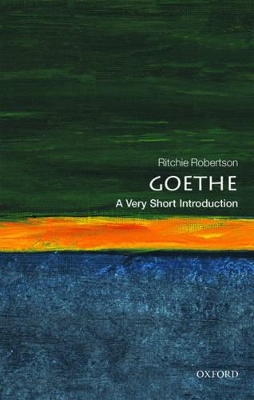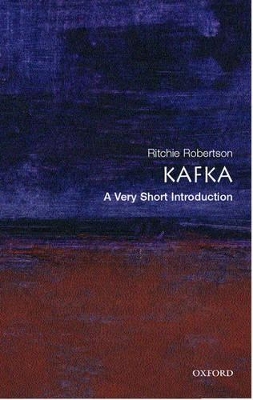Very Short Introductions
2 total works
In 1878 the Victorian critic Matthew Arnold wrote: 'Goethe is the greatest poet of modern times... because having a very considerable gift for poetry, he was at the same time, in the width, depth, and richness of his criticism of life, by far our greatest modern man.'
In this Very Short Introduction Ritchie Robertson covers the life and work of Johann Wolfgang von Goethe (1749-1832): scientist, administrator, artist, art critic and supreme literary writer in a vast variety of genres. Looking at Goethe's poetry, novels and drama pieces, as well as his travel writing, autobiography, and essays on art and aesthetics, Robertson analyses some of the key themes in his works: love, nature, religion and tragedy. Dispelling the misconception of Goethe as a sedate Victorian sage, Robertson shows how much of his art was rooted in turbulent personal conflicts, and draws on recent research to present a complete portrait of the scientific work and political activity which accompanied Goethe's writings.
ABOUT THE SERIES: The Very Short Introductions series from Oxford University Press contains hundreds of titles in almost every subject area. These pocket-sized books are the perfect way to get ahead in a new subject quickly. Our expert authors combine facts, analysis, perspective, new ideas, and enthusiasm to make interesting and challenging topics highly readable.
In this Very Short Introduction Ritchie Robertson covers the life and work of Johann Wolfgang von Goethe (1749-1832): scientist, administrator, artist, art critic and supreme literary writer in a vast variety of genres. Looking at Goethe's poetry, novels and drama pieces, as well as his travel writing, autobiography, and essays on art and aesthetics, Robertson analyses some of the key themes in his works: love, nature, religion and tragedy. Dispelling the misconception of Goethe as a sedate Victorian sage, Robertson shows how much of his art was rooted in turbulent personal conflicts, and draws on recent research to present a complete portrait of the scientific work and political activity which accompanied Goethe's writings.
ABOUT THE SERIES: The Very Short Introductions series from Oxford University Press contains hundreds of titles in almost every subject area. These pocket-sized books are the perfect way to get ahead in a new subject quickly. Our expert authors combine facts, analysis, perspective, new ideas, and enthusiasm to make interesting and challenging topics highly readable.
'When Gregor Samsa awoke one morning from troubled dreams he found himself transformed in his bed into a monstrous insect ...' So begins Franz Kafka's most famous story Metamorphosis.
Franz Kafka (1883-1924) is among the most intriguing and influential writers of the twentieth century. During his lifetime he worked as a civil servant and published only a handful of short stories, the best known being The Transformation. All three of his novels, The Trial, The Castle, and The Man Who Disappeared [America], were published after his death and helped to found Kafka's reputation as a uniquely perceptive interpreter of the twentieth
century.
Kafka's fiction vividly evokes bizarre situations: a commercial traveller is turned into an insect, a banker is arrested by a mysterious court, a fasting artist starves to death in the name of art, a singing mouse becomes the heroine of her nation. Attending both to Kafka's crisis-ridden life and to the subtleties of his art, Ritchie Robertson shows how his work explores such characteristically modern themes as the place of the body in culture, the power of institutions over people, and the
possibility of religion after Nietzsche had proclaimed 'the death of God'. The result is an up-to-date and accessible portrait of a fascinating author which shows us ways to read and make sense of his perplexing and absorbing work.
ABOUT THE SERIES: The Very Short Introductions series from Oxford University Press contains hundreds of titles in almost every subject area. These pocket-sized books are the perfect way to get ahead in a new subject quickly. Our expert authors combine facts, analysis, perspective, new ideas, and enthusiasm to make interesting and challenging topics highly readable.
Franz Kafka (1883-1924) is among the most intriguing and influential writers of the twentieth century. During his lifetime he worked as a civil servant and published only a handful of short stories, the best known being The Transformation. All three of his novels, The Trial, The Castle, and The Man Who Disappeared [America], were published after his death and helped to found Kafka's reputation as a uniquely perceptive interpreter of the twentieth
century.
Kafka's fiction vividly evokes bizarre situations: a commercial traveller is turned into an insect, a banker is arrested by a mysterious court, a fasting artist starves to death in the name of art, a singing mouse becomes the heroine of her nation. Attending both to Kafka's crisis-ridden life and to the subtleties of his art, Ritchie Robertson shows how his work explores such characteristically modern themes as the place of the body in culture, the power of institutions over people, and the
possibility of religion after Nietzsche had proclaimed 'the death of God'. The result is an up-to-date and accessible portrait of a fascinating author which shows us ways to read and make sense of his perplexing and absorbing work.
ABOUT THE SERIES: The Very Short Introductions series from Oxford University Press contains hundreds of titles in almost every subject area. These pocket-sized books are the perfect way to get ahead in a new subject quickly. Our expert authors combine facts, analysis, perspective, new ideas, and enthusiasm to make interesting and challenging topics highly readable.

